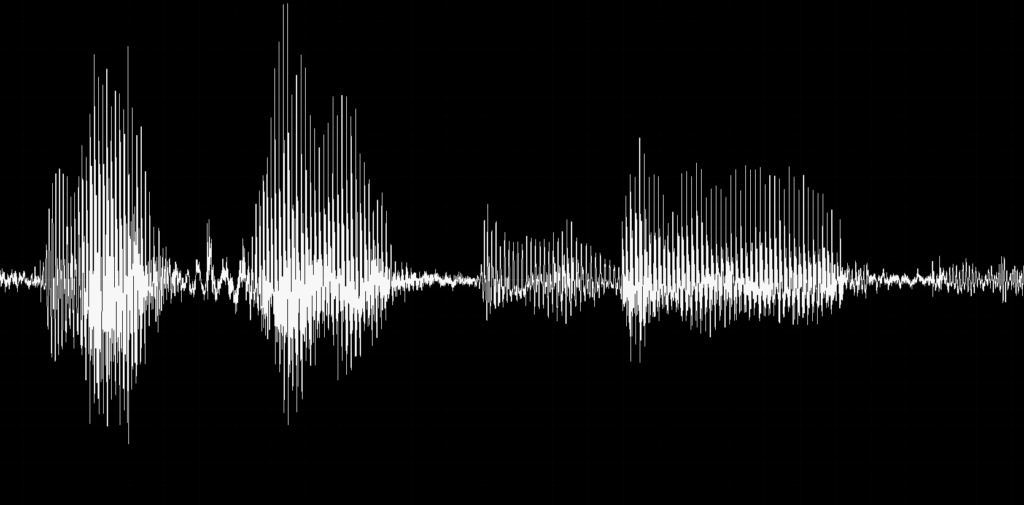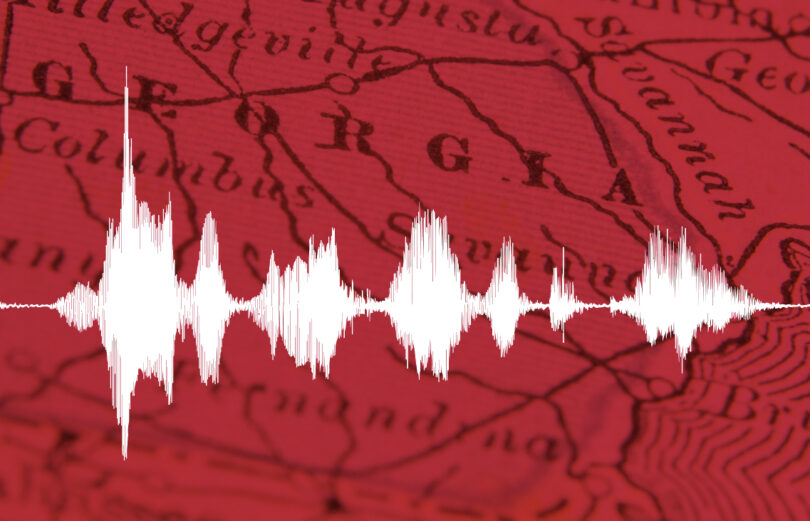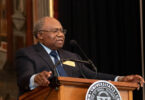All accents have stories, and University of Georgia researchers are telling them.
Linguists Margaret Renwick and Jon Forrest from the Franklin College of Arts and Sciences turned heads in 2023 after publishing a study about Georgia’s fading Southern accent.
The Southern drawl—extending and stretching out vowel sounds in words like taste (tuh-eest) or back (bahyuck)—is disappearing, and younger generations in Georgia are less likely to possess that distinctive twang.

Margaret Renwick studies linguistics and the subtle shifts in accents. Her groundbreaking work on the fading Southern accent in Georgia earned media attention from national outlets like NPR and The Washington Post. (Photo by Andrew Davis Tucker/UGA)
These findings led to an outpouring of media coverage and social media reactions, ranging from, “That makes a lot of sense,” to “Not in my hometown!” According to Renwick and Forrest, both reactions are valid.
“We talk about generalizations like this change, but there are always sub-regional differences and other group differences that matter,” says Forrest, an assistant professor in the Department of Linguistics. “We’re painting a picture of what’s happening in the bigger aggregate of Georgia, but we’re also providing something concrete for people to grab onto.”
All the engagement is exciting because it highlights how linguistics impacts individuals on a personal level. For some people, this study explains a phenomenon they hear but can’t quite describe. For others, it highlights a direct connection to language and accents.
“There’s a very human side of linguistics,” says Renwick, an associate professor of linguistics and lead author of the study. “We’re helping to make sense of the world around us.”
Curating the Soundtrack
Sometimes, linguistic studies start with a hunch.
A good example is when a non-researcher notices that a friend or colleague speaks just a little bit differently, but they can’t quite put their finger on the difference. Linguistic studies provide the data to understand what’s going on under the surface.
“There’s a very human side of linguistics. We’re helping to make sense of the world around us.” — Margaret Renwick, associate professor of linguistics
“I like to think about it in terms of linguistic intuition,” Renwick says. “It starts as a gut feeling or an observation that might be informal, but then our job is to figure out how to analyze it. We can take a recording and slice it and dice it to find and measure what people are hearing.”
Researchers listen to hours of audio clips, isolating and identifying individual sounds within them, and they associate those sounds with different mouth shapes and pronunciation patterns. For their viral study, Renwick, Forrest, Joseph A. Stanley PhD ’20, and Georgia Tech assistant professor Lelia Glass focused on the vowel pronunciations of white English speakers in Georgia. They found that features of a traditional Southern drawl have faded over generations.
The baby boomer generation, born between 1943 and 1964, pronounces “prize” as prahz, while younger Georgians say prah-eez. “Face” transforms from fuh-eece to fayce in younger speakers. And while the shift is most notable in suburbs or cities, it’s happening all over the state.
“Even in rural areas, language is changing,” Forrest says. “Maybe not as fast or in exactly the same way, but it is changing generationally too. It’s never static.”
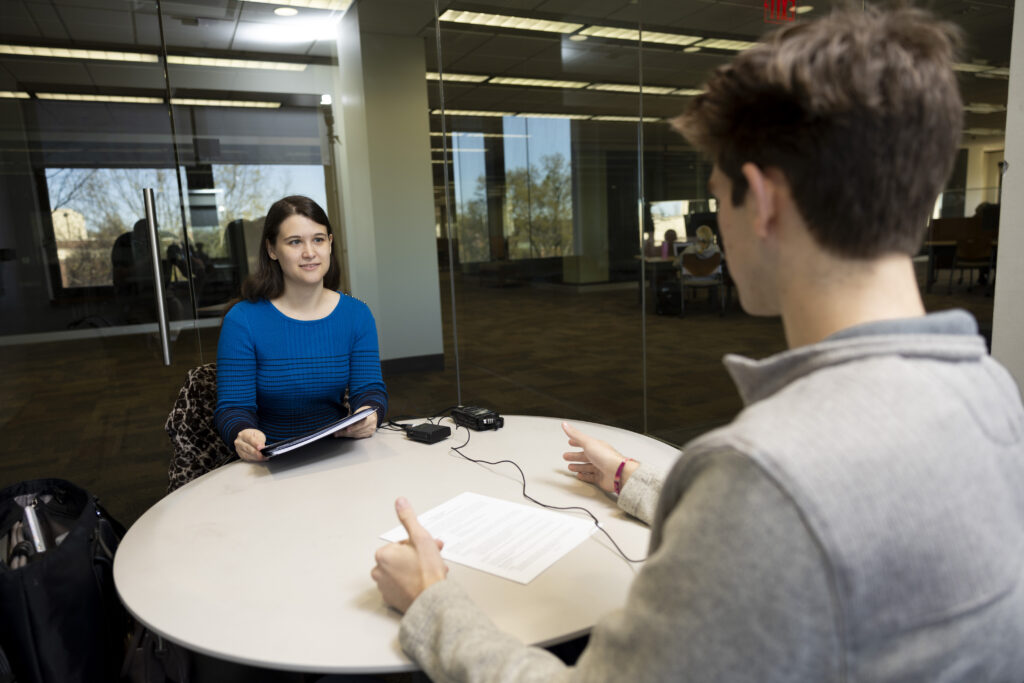
Keiko Bridwell, a doctoral candidate in linguistics, holds community interviews and records the conversations in order to better understand how people relate to language and their accents. These recordings can then be used for linguistic and socio-linguistic studies. She works with Margaret Renwick and Jon Forrest. (Photo by Andrew Davis Tucker/UGA)
A Historical Shift
With each generation, the accent gap has widened, but a lot of it started with members of Generation X, who were born between 1965 and 1982. Changes in pronunciation and accent are often related to how folks have moved around the country, Forrest says.
Following the Second World War, there was a large population shift from Northern industrial cities to growing metro areas in the Southeast.
New residents brought their accents with them, and younger generations from all backgrounds were exposed to a wider variety of speech.
“Kids growing up start to sound like their peers in school, rather than their parents at home—not because they ‘forget’ how language is spoken in the home but because they want to sound like their friends,” Renwick says. “At the same time, people may subtly shift their speech away from that of social groups they don’t identify with.”
Language as Identity
When Renwick and Forrest’s study was picked up by television stations across the South, some people took to social media and defended their region.
“They obviously didn’t come to my town!” was a popular refrain.
And it makes sense, researchers say, because it is important to acknowledge that, for many people, accents are a part of their identities. There is a personal connection to language and how it ties people to their family, their history, and their culture. It’s why some people were upset to hear that the Southern drawl was fading.

Jon Forrest, assistant professor of linguistics. (Photo by Andrew Davis Tucker)
“The Southern accent is tied to being part of a place, the way people do things,” Forrest says. “And you get this feeling of, ‘We’re losing something important by losing this accent.’”
Change can be confusing or frustrating just because it is new, but it’s not something to associate with a value judgment.
“As I look at language and how it’s changing, I always emphasize that it’s not getting better or worse,” Forrest added. “It’s just becoming different.”
Expanding Research
Margaret Renwick and Jon Forrest are exploring accent shifts in many populations, including similar changes in regions outside the South, as well as other groups in the state. For example, Black Georgians historically have been underrepresented in previous research.
Focusing on specific groups is not only necessary from a research perspective, but it also helps connect to the history and stories of each identity group. This study can also build up archival audio and preserve the stories of Black Southerners.
In the Digital Archive of Southern Speech at UGA, which houses thousands of hours of historical recordings, about 75% of the collection consists of speakers who are white. It is one part of a greater linguistic atlas that aims to map how people speak across the country, but it’s not representative of populations across the state and region. So a lot more data collection is needed.
Linguistic interviews start as a conversation, where researchers discuss family history, colloquialisms, and even funny phrases people use. The recordings can be used to analyze speech sounds, but they are also archived in places that can share stories. When researchers enter the community, they hope these interviews provide a positive resource.
“As sociolinguists who do work with communities, we don’t want to just interview you and leave,” Forrest says. “We ask, ‘What do you need to know about language? How can we help tell and document the story of your neighborhood and community?’”
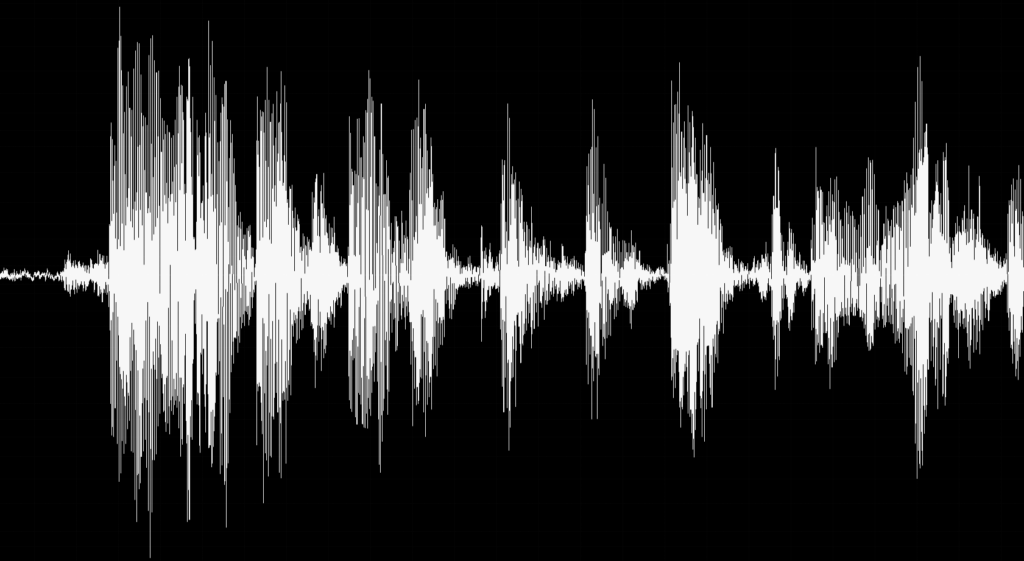
Above, a Generation Z speaker says “back” with a shorter vowel sound. Below, a speaker from the boomer generation says “back” with a longer vowel sound.
